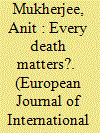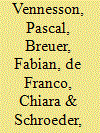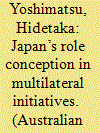|
|
|
Sort Order |
|
|
|
Items / Page
|
|
|
|
|
|
|
| Srl | Item |
| 1 |
ID:
183896


|
|
|
|
|
| Summary/Abstract |
How do combat missions, defined as an armed confrontation that causes casualties, shape civil-military relations and military’s role conception? This article argues that militaries that incur combat casualties gain a stronger hand in the civil-military equilibrium. This is because casualties affect domestic political opinion and give prominence to the views expressed by military officials. Civilians are then more deferential to professional military advice. In turn, the military obtains considerable operational freedom, and can pick and choose missions which they find desirable. Second, the military’s role conception – an important determinant of military missions, is shaped most prominently by its combat experience. Militaries sustaining casualties obtain leverage vis-à-vis civilians and based on their institutional preference, they either prioritise or avoid non-traditional missions. While making these arguments, this article examines combat casualties, role conception, and civilian control in India. These concepts as a whole and, the Indian case study especially are surprisingly understudied considering it is among the few non-Western democracies with firm civilian control, a record of overseas intervention operations and a military with varying roles and missions. Analysing India’s experience therefore adds to the literature and illuminates the mechanism through which casualties affect civil-military relations.
|
|
|
|
|
|
|
|
|
|
|
|
|
|
|
|
| 2 |
ID:
088936


|
|
|
|
|
| Publication |
2009.
|
| Summary/Abstract |
Europe is the region of the world where the network of security institutions is the densest. Yet, these institutions did not erase differences about conceptions of force employment among European countries and between European countries and the United States. Why have concepts of military power and force employment remained distinct and varied in Europe, and yet, what facilitates their convergence at the European Union level into the ambiguous notion of crisis management? We argue that an important answer to these questions is endogenous to the military: both role conceptions and organizational frames of military institutions are key underlying aspects of the differences at the national level and of the common ground at the European Union level. We examine and compare empirically the role conceptions and organizational frames of the armed forces in France, Germany, Italy, and the United Kingdom since the early 1990s
|
|
|
|
|
|
|
|
|
|
|
|
|
|
|
|
| 3 |
ID:
158735


|
|
|
|
|
| Summary/Abstract |
This article examines Japan’s role conception in its multilateral commitments to the Asia-Pacific after the global financial crisis in 2008. The Hatoyama government launched an East Asian Community initiative, which aimed to assume a kingmaker role in creating a new order in East Asia. However, the East Asian Community initiative did not develop due to stress on self-reliance and distance from partnership with the USA. The Abe government sought to play a dual role in its major multilateral commitments. On the one hand, the government sought to play a follower role in enhancing the position of the East Asia Summit with an eye to consolidating the US-based institutional framework. On the other, Abe’s new multilateral initiative of the Free and Open Indo-Pacific represented Japan’s kingmaker role in maintaining a free and open maritime regime, and to keep a liberal and open economic regime under the emergence of the Trump administration.
|
|
|
|
|
|
|
|
|
|
|
|
|
|
|
|
| 4 |
ID:
160463


|
|
|
|
|
| Summary/Abstract |
This article examines how role theory can enhance the middle-power literature in understanding the role preferences of middle powers. Rather than treating it as merely a function of material capability or good international citizenship, this article resituates middle power as a concept of international status that states aim to pursue through the enactment of role conceptions. Thus, it reinstates a conceptual distinction between ‘middle-power status’ and ‘middle-power roles’. The article suggests that the notion of role conceptions can analytically connect the status-seeking behaviour of middle powers with their foreign policy agenda. In so doing, it provides a more nuanced explanation of middle-power behaviour, which might differ between one middle power and another. Using Indonesia and South Korea as case studies of middle power, this article contends that foreign policymakers have strategically conceptualised and enacted several main roles that aim to capture historical experience, as well as ego and alter expectations, in order to pursue middle-power status. These role conceptions determine the foreign policy agenda of states in articulating their middle-power status.
|
|
|
|
|
|
|
|
|
|
|
|
|
|
|
|
|
|
|
|
|